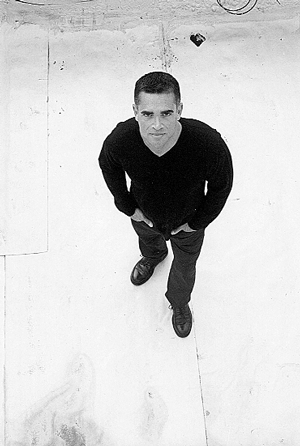Anthony de Mare will premiere several prominent gay works at his big stage appointment
On March 15, the gifted 47-year old pianist Anthony de Mare makes his very gay, belated solo debut in Carnegie Hall.
De Mare will present “Gotham Glory,” an evening of solo piano works and concert theater pieces that celebrate New York City. The program includes world premieres by two New York gay composers, Pulitzer Prize-winner David Del Tredici and Grammy nominee Fred Hersch. Works by incomparable lesbian performance artist Meredith Monk, Tony-award winning Broadway composer Jason Robert Brown, the great Frederic Rzewski, and 2004 Pulitzer Prize-winner Paul Moravec complete a program whose gay subtext is as tantalizing as the music itself.
De Mare is hardly shy when it comes to his sexual identity.
“I’m a gay man and I’m a pianist,” de Mare said in a recent interview with Gay City News. “To me, the only thing that makes it important to combine the two and make my gayness known is when I see resistance or bigotry or any kind of flack from the classical community because they think gay content is too challenging or too personal for a general audience.”
De Mare cited the 2001 San Francisco Symphony debut of Del Tredici’s orchestral song cycle, “Gay Life.” Although the work, which included settings of words by Allen Ginsburg and Paul Monette, merited criticism for its occasionally repetitious and pedantic overstatement, the extra-musical bashing of Del Tredici for his celebration of the gay experience was unwarranted and ignored the work’s brilliant and beautiful writing.
Some critics, including openly gay ones, seemed embarrassed by the work, even suggesting that Del Tredici had overstepped boundaries by telling his story in public.
“When that’s the case,” de Mare explained, “people have to be challenged even more. It’s abominable that we’re human beings who can’t have the same civil rights as other people. Move from the social to the arts, and they protest that you can’t say who you are as a person through music.”
De Mare said that, in a forthcoming appearance in Salt Lake City, he is unable to include one of his signature pieces—a work that figures prominently in the Zankel program—Frederic Rzewski’s “De Profundis.” Written for de Mare in 1992, and recorded by him in 1995, the straight Rzewski’s setting of Oscar Wilde’s famed statement takes on special meaning in the hands and voice of a gay artist.
“All of my experiences are embedded in one way or another into Oscar Wilde’s text,” explained de Mare, who is living with HIV. “This makes it a very profound and moving piece for me. There are moments in certain performances when I have to refrain from starting to cry because the words touch me so deeply.”
De Mare pushes barriers in multiple ways. The cover of his 2000 CRI CD, “Wizards and Wildmen,” so provoked one critic that he suggested de Mare had posed naked and asked if he’d be performing the same way in Zankel. “But I wasn’t naked,” de Mare protested with mock seriousness. “I just had my shirt off [laughing].
If de Mare’s posing caused a stir, so did his show “Playin’ My Self.” Some audience members were deeply moved by one piece in the show, while others objected. Based on one of the pianist’s former relationships, it was performed as though it were an online relationship. The true-to-life text hit close to home. Some critics questioned why de Mare was doing something so personal. What is allowed in literature, dance and theater still remains suspect on the classical concert stage.
De Mare’s program at Zankel will embrace New York’s artistic traditions with emphasis on the stylistic crosscurrents among classical, Broadway and jazz compositions that go a long way toward breaking down genre boundaries.
The program’s title, “Gotham Glory,” is taken from Del Tredici’s work of the same name. De Mare has performed and recorded a number of pieces by Del Tredici, including five mostly romantic works on his new, beautifully played Koch CD, “Out of My Hands.” “Gotham Glory” consists of four pictures of New York: “West Village Morning,” “Museum Piece,” the 9/11 requiem “Missing Towers” and “Wollman Rink.”
“The last movement is extremely gay,” de Mare said. “It winks at the audience. As it goes on, it becomes more dramatic and much more deeply felt. It includes moments that David really meant to be campy and charming, and others that are very dramatic and meaningful. There are so many facets of being gay and how we see it for ourselves. One is the acknowledgment of the masculine and feminine within. David really captures the feminine and masculine energies within this piece. If anyone can tap into the animated qualities of being gay, it’s Del Tredici.”
De Mare will also debut Paul Moravec’s driving and exciting “Isle of the Manhattoes,” Fred Hersch’s “Saloon Songs” and Jason Robert Brown’s impressionistic “Mr. Broadway.” He said he feels especially honored to play the oldest piece on the program, Meredith Monk’s “Gotham Lullaby,” an acknowledgment of her 40th anniversary as a performer, composer and choreographer. And, of course, there is the monumental “De Profundis.”
“Once all the pieces were in,” de Mare explained, “I discovered that this program completely encompasses who I am as a pianist and as a person. I’ve been here 25 years, and there’s so much in the city that’s part of me. These are the different aspects of my life. Each of these pieces individually taps into certain individual things. But as a collective unit, it’s the whole enchilada, and something people will be able to identify with.”
gaycitynews.com


































